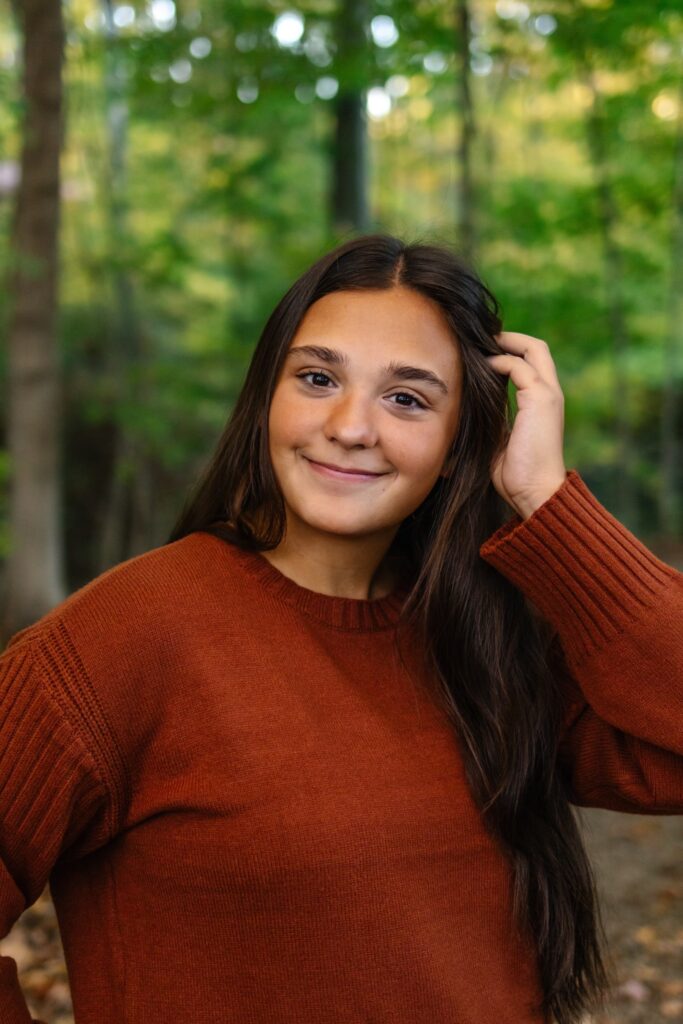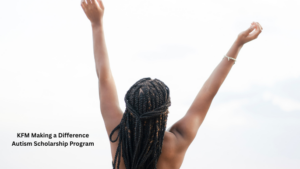This guest post is by Katrin Parker, a young woman who attends University of Michigan. She is an advocate for the Spring 2025 Making a Difference Autism Scholarship via the nonprofit KFM Making a Difference started by me, Kerry Magro. I was nonverbal till 2.5 and diagnosed with autism at 4 and you can read more about my organization here.
Autistics on Autism the Next Chapter: Stories You Need to Hear About What Helped Them While Growing Up and Pursuing Their Dreams was released on Amazon on 3/25/25 and looks at the lives over 75 Autistic adults. 100% of the proceeds from this book will go back to supporting our nonprofits many initiatives, like this scholarship program. Check out the book here.
I am paralyzed: Feeling the walls closing in around me, boxing me in. Erect as if I were balancing on a tightrope wire. My blood boiling with hot anxiety. My hair rising from the chilled winter air against my skin. My nerves aflame.
Teetering on the edge of my seat, I searched my therapist’s face for the slightest indication of what she would say next.
When I was younger, I remember my parents inviting families over, and instead of rambunctiously playing with the kids my age, I sat with the adults and sloppily attempted to engage in their discussions. I would scrupulously organize my fruit snacks into a color-coordinated pyramid before eating them sequentially, row by row. I even had daylong meltdowns because at lunch my brother had received one more pretzel than I and I was convinced life would forever be unfair.
All these seemingly nonsensical behaviors had always felt natural to me, but as I grew older, they isolated me from my peers. I always found myself masking because I was “too extreme,” “too weird,” and “too awkward” for everyone around me. At the end of middle school, I started to realize that I had never felt safe in my skin. I had no friends who truly knew me, and I was constantly left wondering, “What is wrong with me”? and “Why do I have to work so hard to function like everyone else”?
As high school began, my anxiety worsened, and I withdrew further from the world.
The winter of freshman year was my breaking point. After years of playing a part, my brain began living in two opposing states: one in the public eye and the other—my true self—only when safely alone in my room. I finally realized that I could no longer sustain a lifestyle in which I hid myself for the comfort of others. My parents and I started searching for answers and eventually scheduled a therapy appointment. One painstaking hour into my first session, after asking a plethora of open-ended questions that left my mind strained and frozen, my therapist said,
“I believe you have autism spectrum disorder.”
Finally, someone had listened. Finally, someone had validated my struggles. Finally, I would not have to suffer alone.
Overwhelmed with relief, I could not help but smile. The hundreds of anxious thoughts in my mind melted away.
Less than a year later, I had an official autism spectrum disorder diagnosis, and I was ecstatic. Now I have access to accommodations and understanding that I never had previously.
Since then, I have only begun to scratch the surface of who I am, but my newfound understanding has provided me with invaluable direction for my life. My diagnoses do not define me but rather enable me to acknowledge my needs and behaviors; my brain’s inner workings; and my past, present, and future in a new context. I am able to give myself permission to see my desire for adult conversation as the unquenchable thirst to understand the world around me, my compulsion to organize as a keen ability to hyper-fixate on arduous tasks and topics, and my exacting sense of fairness as the magnetic draw to expanding the confines the world assumes we must obey.
Additionally, the judgment I have faced has provided further insight into the struggles I have personally experienced and empathized with in other fellow neurodivergents. Each disheartening comment I receive serves as a reminder of how easily the complexities of mental disabilities are overlooked. Now, my lifelong goal is to shift perceptions and promote understanding instead of judgment for the autistic community and beyond.
I intend to dedicate my career to exploring the gray areas of the body, specifically the connections between our physical and mental experiences, drawing from psychology and neuroscience. Often, mental conditions influence our physical sensations; for example, my experiences with neurodivergence have made me acutely aware of how my physical symptoms—such as nerve pain, a racing heart rate, or unexplained twitching—correlate with moments of overstimulation. This unique perspective fuels my desire to pursue a research career to delve deeper into these complex phenomena and has further developed my empathetic understanding of the struggles faced by individuals with physical and mental disabilities and illnesses.
In society, we force ourselves and others into boxes. Boxes that choke and stifle diversity and passion simply because differences are “uncomfortable” for others to grasp. I want to change this narrative by helping people understand themselves and each other. I want to understand, discover, and revolutionize the world’s definitions of what a person can be. I want to help create a world where everyone can pursue their passions without impediment and no one has to force themselves to mask their unique identity because they are different.
There are never situations beyond innovation, beyond inclusion, or beyond understanding. I intend to illustrate that these aspirations can be realized and help the world to learn how to live outside the box.
Kerry Magro, a professional speaker and best-selling author who is also on the autism spectrum started the nonprofit KFM Making a Difference in 2011 to help students with autism receive scholarship aid to pursue a post-secondary education. Help us continue to help students with autism go to college by making a tax-deductible donation to our nonprofit here.
Also, consider having Kerry, one of the only professionally accredited speakers on the spectrum in the country, speak at your next event by sending him an inquiry here. If you have a referral for someone who many want him to speak please reach out as well! Kerry speaks with schools, businesses, government agencies, colleges, nonprofit organizations, parent groups and other special events on topics ranging from employment, how to succeed in college with a learning disability, internal communication, living with autism, bullying prevention, social media best practices, innovation, presentation best practices and much more!














